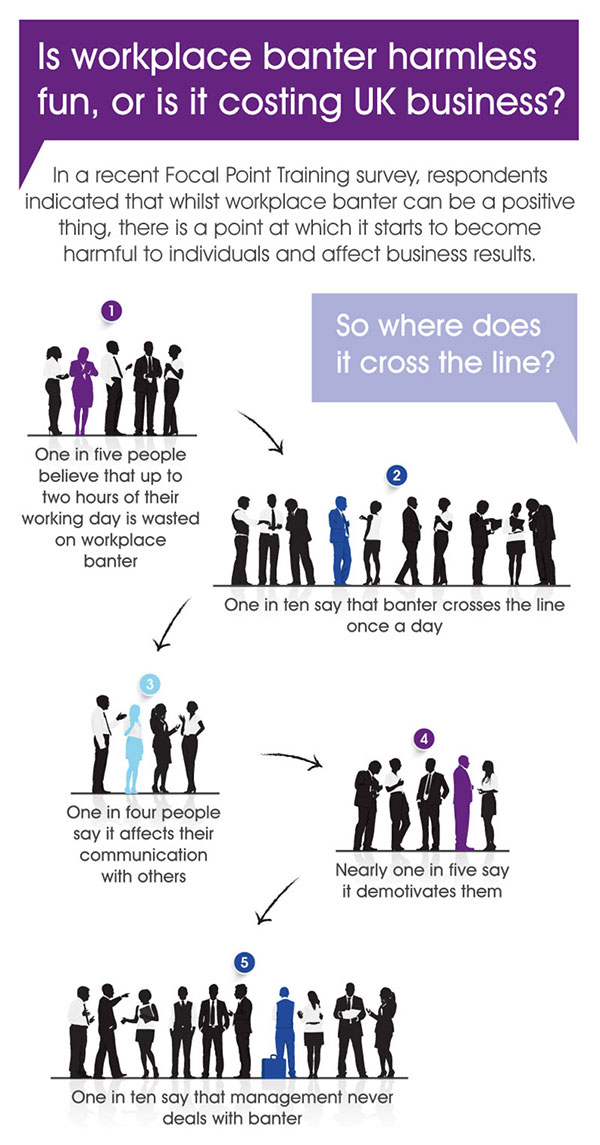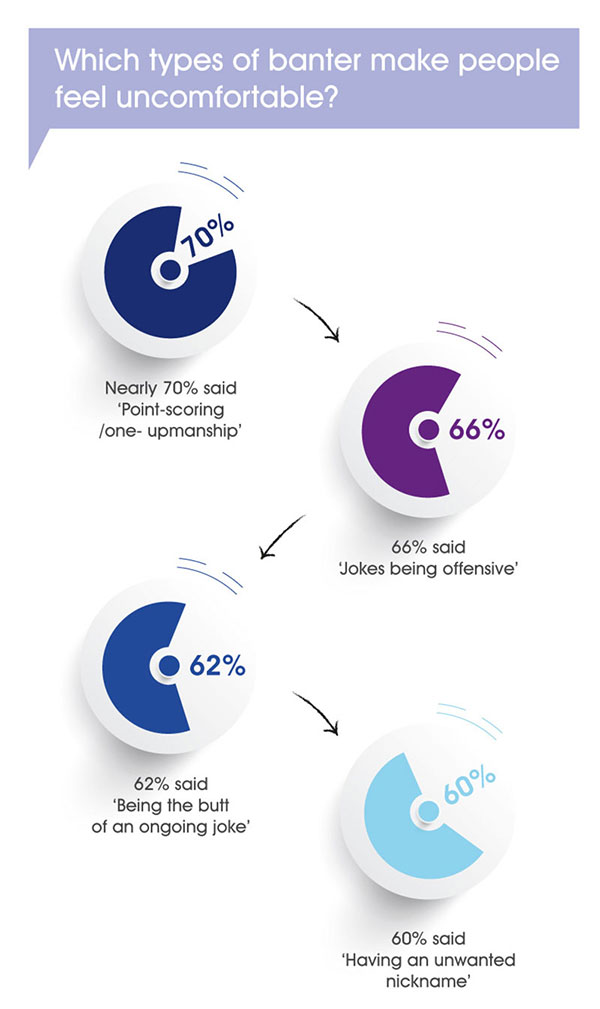Where is the line between sharing a joke with a colleague and inappropriate behaviour that could cause negative harm? According to workplace behaviour company Focal Point Training and Consultancy, inappropriate behaviour isn't the reserve of an office-based environment. Stella Chandler, director of development at Focal Point Training and Consultancy, explains how banter can turn into inappropriate behaviour, how to stop this from happening in the workplace, and why more people aren't speaking up on this issue.
How would you describe banter and what is its role in the workplace?
I would describe banter as things that are discussed and normally with the intention of making people laugh together. It can bring teams together, with shared stories that help people bond. However, when it starts to make people feel uncomfortable, we say it has crossed the line. If someone feels uncomfortable they will usually feel excluded, so teams that say they are inclusive are not if they have excluded someone in this way.
Our view is very clear – it is vital that we retain the fun and humour in workplaces. Many of us spend more of our waking hours with colleagues than with family members or friends and we need those hours to be enjoyable. Our working environments should be somewhere people want to participate, build relationships, and collaborate, and humour can help with that. It is a great way to gel teams and create a shared bond.
But we must recognise that this can all be achieved within a framework of respect. There is no doubt that banter can break down barriers, but if it crosses the line it brings barriers back up.
How would you describe inappropriate behaviour?
Inappropriate behaviour can be summed up as behaviour that has made someone feel uncomfortable. However, this excludes when someone has been given developmental feedback in the right way. They may say this has made them feel uncomfortable, but this is not what we mean.
When banter crosses the line from being fun for everyone to making people feel uncomfortable, it has become inappropriate.
It isn’t an easy question to answer and it is important we all acknowledge that. If we fall back on a “surely it’s common sense” argument, we are not recognising the complexities that navigating human relationships and behaviour entails. And honestly, if it was that easy and clear cut, we simply would not have the levels of grievances and the media headlines around behaviour that we do.
What one person finds hilarious, another could find offensive. What is deemed OK in one working environment may not be in another. What is acceptable between close friends often isn’t when it is colleagues. And if company policies say one thing, but the behaviour of the senior leadership team points to an entirely different standard, where does that leave everyone?
While doing a ‘purposeful wander’ (see boxout) with a client, two men were introduced to me as ‘Big Chris’ and ‘Little Chris’. I talked to both of them later and they both told me they hated their nicknames, but everyone assumed they were fine and it was OK to introduce them as such, as they had done to me. ‘Little Chris’ was below average height for a man and was constantly reminded of this with jibes by his friends and colleagues. ‘Big Chris’ had a health condition and despite every effort couldn’t reduce his weight. His frustration was compounded on a daily basis with comments like “look who ate all the pies”. I am proud to say our work in that organisation resulted in both of the men being called Chris, without the 'Big' or 'Little'.
A purposeful wander
Stella describes a technique she uses with her clients:
“When we are in the set-up phase for a project, we like to get a feel for a client’s culture through ad-hoc conversations with team members. We are not looking to put someone on the spot, but just to open a discussion. We will talk about the project and ask them what they would like to see come from it. This often gives us a sense of what the key issues are for team members."
How can nicknames in the workplace cause offence?
Nicknames are fascinating. It is important to distinguish between those that are genuinely liked, and those people find ways to put up with. An example of the former is my 87-year-old father, who uses a nickname he was given in his twenties that he much prefers to his birth name. A nickname that causes offence doesn’t have to be a derogatory word. An example of this is a team that called their manager Dad, as he was the age of their own fathers and they felt he looked out for them. They were shocked to discover it offended him as he didn’t want to be seen in this way – he wanted to be respected as their workplace manager.
What are some practical tips that can be implemented in the workplace, from the point of view of managers and staff?
Have conversations with team members, always verbally, never in writing – it's easier to misinterpret the written form, we put our own interpretation on the words, plus when done verbally there is a chance to ask questions for clarification and understanding – about what is and isn’t appropriate behaviour. We call this ‘decoding policies’. Most organisations have policies in these areas, but few ensure employees really understand what they mean in practice.
All too often the first time an employee hears about them is when they are told they have behaved inappropriately. We help managers see the many reasons that may stop them from dealing with inappropriate behaviour. These may include not wanting to be the ‘fun police’ or not knowing how to deal with a situation.

Source: Focal Point Training and Consultancy
What should workplaces be aware of in terms of inappropriate behaviour and the law, and where is the line between bullying and harassment?
We must be aware of the law, but ‘inappropriate behaviour’ is wider than that. We know that when people feel uncomfortable, whether we define it as being bullied or being harassed, their motivation is likely to drop, they are less engaged, and they are less likely to be creative or contribute as well as they could when they are happy.
Employees can say things such as “I am being bullied” or “I am being harassed” interchangeably, so it is key to find out what the specific circumstances are. An example of bullying is when someone is given an unreasonable workload. An example of harassment could be when constant references are made about a protected characteristic, for example, someone who has a disability and uses a wheelchair.
A BBC survey of over 2,000 UK adults, published in October 2017, finds that 53% of women and 20% of men have experienced sexual harassment at work or a place of study. How does sexual harassment tie in with inappropriate behaviour, and what can workplaces do to address the issue?
Sexual harassment often starts with an inappropriate act; a joke, or perhaps a reference to someone’s appearance said with a suggestive tone of voice. If not nipped in the bud it is often repeated using more daring references and may lead to other examples of sexual harassment, such as unwanted touching. We often find situations, where it is agreed sexual harassment has taken place, where the behaviour started with a joke that escalated.
Workplaces should hold open discussions about what inappropriate behaviour is, including sexual harassment. The positive of this is that many people are appreciative of being able to ask questions about what is often thought to be a difficult issue to discuss with colleagues.
If this – or any other type of inappropriate behaviour – is left unchecked, it becomes not just tolerated but normalised. If this is happening at senior levels, others can assume this is OK, taking their lead from managers and leaders in a business.
In the Racism ruins lives report, published in 2019, almost 15% of women and 8% of men state that racial discrimination has caused them to leave their job, while 28% of participants who report experiencing racism at work say they have had to take a period of sick leave. How can racial discrimination in the workplace be stopped?
First, people must understand what racial discrimination in workplaces is and how it manifests itself. A good way to get people to do this is to think about the processes their organisation uses, such as recruitment. Do any of the stages discriminate? If so, what can they do differently? Next is having a dialogue amongst colleagues. Discussing issues of race can also be difficult for people. Common concerns are people saying they don’t know how to open conversations and they are worried about causing offence.
People often worry about what language to use; what is OK and what is not. They fear getting it wrong, so say nothing, which is the worst option. Recently, we have been asked by clients to lead workshops for teams where we are helping them overcome these concerns and for them to see the benefit of opening up conversations and being able to ask questions to understand how they can support colleagues.
A Focal Point survey reveals that nearly one in five people say negative 'banter' demotivates them at work. A negative work environment can also impact on a person's mental health. How can this manifest itself?
If someone is feeling uncomfortable because of a negative working culture, it is likely to affect their self-esteem and sense of self-worth. This can become a vicious circle, as it can affect how they feel about themselves in other parts of their lives. I don’t believe we recognise enough the links between workplace cultures and people’s overall mental health and wellbeing. This situation has become more pronounced in lockdown and especially amongst younger people. Mental health charity Mind published a report in June 2020, which surveyed 1,917 young people aged 13–24. The report states that more than half of adults and over two-thirds of young people said that their mental health became worse during the period of lockdown restrictions from early April to mid-May.

Source: Focal Point Training and Consultancy
Why aren't more people speaking up about the negative impact of inappropriate behaviour in the workplace?
People think and feel a range of emotions; often they are concerned about being a killjoy, or being labelled as someone who can’t take a joke or who is politically correct. It may be their manager or a senior person who is behaving inappropriately and they may find speaking up hard in these situations.
About the expert

Stella Chandler is the director of development at Focal Point Training and Consultancy. With her co-director Tracy Powley they have run the company since 2001, specialising in helping organisations tackle inappropriate behaviour at work.
She has worked as a trainer, facilitator and coach at every level in a wide range of organisations. She frequently speaks at conferences, on webinars, discussion panels and BBC radio programmes.
Stella is a fellow of the Chartered Institute of Personnel and
Development and the Institute of Leadership and Management.
Other factors include being branded as difficult or the impact it could have on career prospects. This is likely to be more prevalent at this time as people are concerned about potential redundancies in their organisations.
Sadly, a major reason for people not speaking up is that they don’t think anything will be done about it. It is key to open conversations in the right way to overcome these barriers.
Homeworking means that there are multiple ways employees are communicating, and therefore multiple opportunities for inappropriate behaviour to occur. What inappropriate behaviour is happening while in this working set-up, and how should this be handled?
Working from home – or in places away from our organisation’s buildings – has meant an increase in the methods of communication we have. Instant messaging platforms have led to people responding very quickly, often without thought for how their words may be interpreted. People are often using the same platforms for communicating with their family and friends as they are with work colleagues, so the lines are further blurring for them as to what is OK in a work situation and what is not.
Recent research finds that inappropriate behaviour is being amplified in the current situation. For example, women are being asked to dress up for videoconference meetings and people are feeling less scrutinised when they are working at their kitchen table rather than at a desk next to their colleague, so behaviour slips more easily.
Recent Chartered Institute of Personnel and Development research into WhatsApp groups, as reported in a Financial Times article, finds that 40% of respondents say the groups undermined corporate culture and in one instance WhatsApp was primarily used for “gossiping and bitching”.
Key to managing this is opening discussions with employees and agreeing on how people will work together and communicate in these changing times. What hasn’t changed is we must never intentionally behave inappropriately with our colleagues. We need a culture that supports victims and leads to people accepting and changing their inappropriate behaviour.